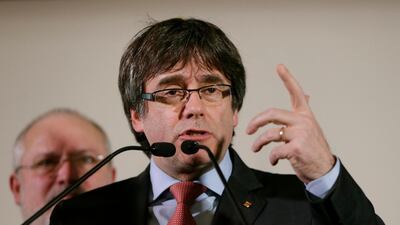Carles Puigdemont is set to be re-elected as Catalonia’s leader later this month, after an agreement was made by the region’s main separatist parties.
Mr Puigdemont, who is living in exile in Belgium to escape imprisonment in Spain following October’s independence referendum, made the deal with Marta Rovira – the Esquerra Republicana (ERC) party’s second in command – at a dinner in Brussels.
Ms Rovira is serving as caretaker leader of the ERC, the second largest pro-independence party in Catalonia’s parliament, after Oriol Junqueras was imprisoned on charges of rebellion, sedition and misuse of public funds.
Although the pro-unity Citizens party won the most seats in December’s regional election, the three separatist parties combined hold the highest number of seats, winning two more seats than the 68 required to form a government.
Mr Puigdemont said, in an article for Politico on Wednesday, that the results proved "the desire to be free from Madrid is rising, it is in the majority and it is lasting over time, despite the huge difficulties it faces".
The Junts per Catalunya party (JuntsxCat), which Mr Puigdemont leads, and the ERC have agreed to support the exiled former President of Catalonia when he puts himself forward for a vote of confidence after the new parliament has been formed.
Owing to his exile, the ousted JuntsxCat leader will appear via video link in the regional parliament to give the speech required by presidential candidates before the vote or have his statement read by proxy, according to El Pais.
“The December 21 result gave us the mandate to reflect the majority. The presidential candidate will evidently be Puigdemont,” JuntsxCat’s representative Jordi Xucla told Spanish national radio.
_______________
Read more:
Former Catalan president presses his case for a return to power
Spain's king urges Catalan leaders to act responsibly
Let me come back, Catalan leader tells Spain
_______________
The pro-independence parties’ choice will cause upset among those hoping for a more moderate choice to try to heal the divide between Barcelona and Madrid.
His candidacy could also cause some problems legally as it is not clear whether Mr Puigdemont will be permitted to take up his role from abroad.
The rules state that the leader must present the government’s programme “in front of the house” but do not specify whether he or she must be physically present or whether video conferencing will suffice.
The former Catalan leader ruled out a return to Spain on Tuesday, saying: “It is not possible to return to Catalonia.”
He has previously said he will only return if he is offered certain “guarantees” by Madrid.
The decision comes one day after Artur Mas, a former Catalan president, resigned as head of one of the separatist parties, the PDeCat party.
PDeCat formed a political alliance with JuntsxCat in the December election, winning 34 seats in the assembly.
Mr Mas said he was stepping down to allow new leaders of Catalonia’s independence platform to come forward, following reports of division within the secessionist parties.
“This new stage requires new leaders, it is necessary to leave open spaces so that certain people can lead this project for the future,” the former PDeCat leader told a news conference.
Mr Mas was banned from holding public office for two years in March 2017 after he staged an informal independence referendum in 2014. However, he continued to lead PDeCat.
The pro-independence movement is split over whether to continue with secessionist efforts following the fallout from the banned independence referendum, which caused the worst political crisis in Spain for 40 years.
December’s election proved to be indecisive for the separatists, who won the most seats but failed to win 50 per cent of the popular vote.


